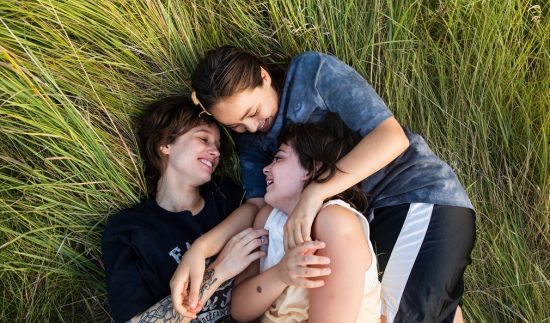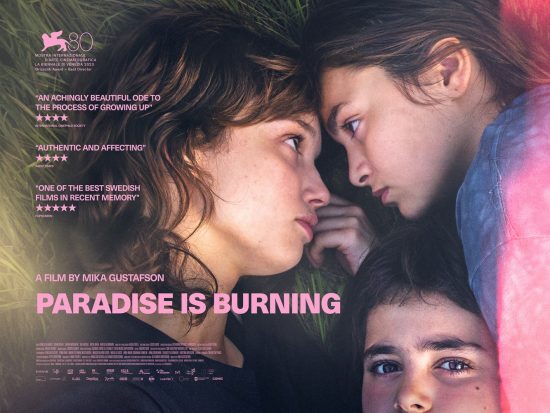Review: Paradise Is Burning – “an exciting new voice in world cinema.”
Scandinavian filmmaking at large continues to generate promising talent that often reaches the frequencies of Hollywood buzz. From Denmark (Lars Von Trier) to Norway (Joachim Trier) and of course the ever-active Swedish hub that has given us the Skarsgård family and most recently multi-Oscar nominated Ruben Östlund (Triangle of Sadness): it’s an embarrassment of riches.
The latest addition to this prolific club is Swedish writer/director Mika Gustafson who, after being already active in the documentary landscape, now makes an entrance with her debut narrative feature Paradise is Burning (Paradiset Brinner), which last year already earned her the Orizzonti Award for best directing and screenwriting at the Venice Film Festival and the Sutherland Award for best first feature at the BFI London Film Festival.
Like an almost inevitable rite of passage, Gustafson’s first film is a coming-of-age tale. Still, she finds a rather compelling take on the beloved genre by telling the story of three young sisters with an absentee mother, who take care of themselves and each other but now risk winding up in foster care. It’s like a Dickensian, kitchen-sink Little Women with anarchic vibes reminiscent of TV’s Shameless but set in a Stockholm working-class area, brimming with quirky humour, feminist spunk, and queer undertones.
Being the eldest sibling, sixteen-year-old Laura (Bianca Delbravo) is a bit like Fiona Gallagher in Shameless, taking the reins of the family and acting like a vocational parent to younger sisters Mira (Dilvin Asaad) and Steffi (Safira Mossberg). There’s no trace of either parent being ever around and there’s no need for an easily inferable backstory to spell out why the siblings have been left to their own devices. Yet it’s immediately clear that the trio has been and still is under social services’ scrutiny.
The girls live in total freedom, maintaining a basic level of hygiene but otherwise making unhealthy choices and scraping by when it comes to food and other primary needs. If Steffi has wet the bed, Laura is immediately on cleaning duty but when we look closer at the stove or the kitchen table after a family meal, things look quite messy. It’s not as if they’re living in squalor but there’s no denying it’s a case of high-functioning neglect.
Just like they have their well-oiled teamwork of diversion tactics for stealing goods at the supermarket, the sisters also have tricks up their sleeves when sneaking into people’s homes to enjoy gardens and swimming pools when the owners are away. It’s the cusp of summer after all and what’s better than impromptu parties in the fields with other teenage girls of the wildest kind, drinking and smoking the night away?
It is true though that all that glitters is not gold, and the film’s title is practically a statement of what the story is all about. No matter how hard she tries, Laura is not a fully-fledged adult yet so she can’t possibly provide the level of care her younger sisters (who are only 12 and 7 years old) need, because she deserves to still be and act her own age. There are cracks in the walls and things are falling apart. The seemingly idyllic life the trio has been leading is unsustainable. Paradise is indeed burning.
Laura is highly protective of Mira and Steffi and is ready to break the nose of anyone bullying them at school but there’s only so much she can do as it’s not her job to raise them. When a streak of school attendance gaps triggers a call from social services, due to their family record, Laura is given the warning of an imminent visit from an agent who will need to speak with their mother to straighten things out. Overwhelmed by panic she keeps the news secret from her sisters, and obviously that’s a recipe for disaster.
The film’s central tension is built around this looming threat with Laura trying to go about life business as usual whilst trying to find someone to impersonate their mother at the appointment. However, her usual options – the neighbour lady who already does what she can to help them and their estranged auntie who works in a moving fair – won’t budge, given the illegal implications of such a request.
A fortuitous meeting with an older woman and equally lost soul named Hanna (a pitch-perfect Ida Engvoll), gives some breathing room to Laura, who lures her new friend into her home invasion shtick. But the initial fun of raiding empty houses with a stranger who could potentially become the long sought-after poser for the social services scam comes crumbling down when the sexual tension between them must reckon with Hanna’s hidden personal life.
Meanwhile, Mira and Steffi have their own growing pains to deal with and as Laura spends more time with Hanna, tensions arise when she’s back trying to claim her authority and the sisters inevitably rebel. Gustafson and her co-screenwriter Alexander Öhrstrand have crafted a well-rounded dynamic amongst the siblings and a believable conflict when it comes to the emotional implications of their tight-knit relationship.
The cinema verité aesthetics, seamlessly interwoven with moments of lyrical beauty captured by Sine Vadstrup Brooker’s cinematography, perfectly complement the naturalistic performances of the talented up-and-coming trio of young actors, whose chemistry is evident from the first frame they appear together on screen. Some detractors, however, may lament the lack of meatier story beats and consider the filmmaker to be more preoccupied with meandering realism than substance.
Truth is that Paradise is Burning may not add anything new to the genre but as a feature debut leaves the indelible impression of an exciting new voice in world cinema. Gustafson’s command of the craft is evident from the opening image with a tracking shot of a stray dog running for dear life along a desolated road at dawn. It is not a random choice. Just wait and see how the symbolism behind such a brief sequence develops into the story. This is how the art of filmmaking stimulates your senses.
Paradise is Burning is in UK cinemas from August 30th,












